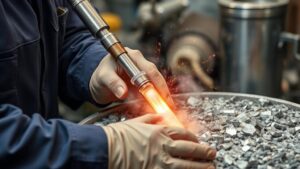The Role of Innovation in Modern Gold Mining Techniques
Introduction
The role of innovation in modern gold mining techniques cannot be overstated. Over the centuries, the quest for gold has spurred technological advancements that have dramatically transformed mining operations. From the manual panning methods of ancient civilizations to todays high-tech solutions, the evolution of gold mining reflects broader technological trends and the demands of a growing global economy.
Historically, gold prospecting relied on rudimentary techniques, often involving manual labor and simple tools. As industrial advances emerged in the 19th century, the introduction of steam power and mechanization revolutionized extraction processes. But, it wasn’t until recent decades that digital technology and environmental sustainability became pivotal in shaping modern practices, allowing for safer, more efficient, and environmentally responsible mining.
Foundational Concepts and Equipment
Understanding the fundamental concepts and equipment used in gold mining is essential for grasping the significance of innovation in this field. Key terms include:
- Hard Rock Mining: This involves extracting gold from solid rock, often requiring drill and blast techniques.
- Alluvial Mining: This simpler method extracts gold from riverbeds and sediment using gravity separation techniques.
- Heap Leaching: A process that involves piling crushed ore onto lined pads, where a leaching solution extracts gold over time.
Equipment commonly utilized includes:
- Excavators: Used for digging and moving large volumes of material to expose gold-bearing rock.
- Crushers: These machines break down rock into smaller pieces, facilitating easier extraction processes.
- Concentration Tables: These tables employ gravity to separate heavier gold particles from other materials effectively.
Step-by-Step Methodology
The methodology of modern gold mining can be broken down into several key steps, each involving innovative techniques and equipment:
- Site Surveying: Utilizing GPS and geophysical methods, miners can identify gold-rich areas. For example, geophysical surveys can reveal density and magnetic anomalies indicative of gold deposits.
- Drilling: Rotary drilling techniques are employed for sampling and evaluating the quality of the ore. This method provides precise information to enhance extraction efficiency.
- Extraction: Depending on the deposit type, processes like open-pit mining or underground mining are selected. Technology such as automated drilling systems can increase precision and reduce safety risks.
- Processing: Advanced milling and extraction technologies, like gravity concentration and flotation, are utilized to maximize recovery rates with minimal environmental impact.
Advanced Techniques
Also to the traditional methods, advanced technologies play a crucial role in modern gold mining. e include:
- Automation: Robotics and automated systems optimize production by minimizing human error and injuries. For example, autonomous haul trucks reduce labor costs while ensuring continuous operation.
- Data Analytics: The use of big data analytics for predictive maintenance of equipment can lead to significant cost savings and improved efficiency. By analyzing usage patterns, companies can preemptively address failures and minimize downtime.
- Environmental Monitoring Tools: Innovations such as environmental sensors ensure compliance with regulations and safeguard ecosystems. e tools monitor air and water quality, biodiversity, and land reclamation efforts.
Legal, Ethical, and Safety Frameworks
Modern gold mining operations must comply with an array of laws and regulations designed to protect the environment and ensure worker safety. Key elements include:
- Permits: Mining companies must obtain various licenses, including exploration and operational permits, which require extensive documentation and adherence to environmental standards.
- Health and Safety Regulations: Regulations such as the Mine Safety and Health Administration (MSHA) guidelines in the United States set stringent safety standards to prevent accidents and protect miners.
- Environmental Impact Assessments (EIAs): Projects must undergo EIAs to evaluate potential impacts on local ecosystems and communities, driving sustainable practices.
Practical Field Guidance and Resources
When identifying optimal sites for gold mining, several criteria should be considered:
- Geological Surveys: Conduct detailed assessments to locate gold-bearing formations and assess accessibility.
- Environmental Conditions: Evaluating regional climate and terrain helps inform the choice of extraction techniques and equipment.
- Community Engagement: Collaborating with local populations ensures sustainable practices and adherence to cultural considerations.
For practical implementation, miners should invest in training programs that focus on using advanced technologies and compliance with regulatory requirements. Such knowledge is crucial for safety and operational success.



